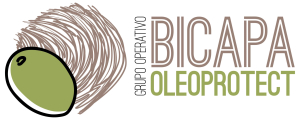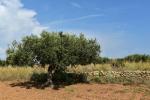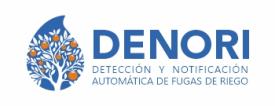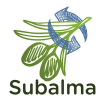
BICAPA-OLEOPROTECT Operational Group: Olive groves optimized by implementing improved anti-weed nonwoven bilayer
- Type Operational group
- Status In progress
- Execution 2024 -2025
- Assigned Budget 299.997,69 €
- Scope Autonómico
- Autonomous community Andalucía
- Project website GO BICAPA-OLEOPROTECT
A demonstration of efficient olive crop management will be obtained through the use of new products (nonwoven weed-repellent bi-layer), quantifying and evaluating their effect on the crop through the use of sensors and data managers that demonstrate the benefits of this new approach.
Stable soil temperatures will be achieved, given the technical characteristics of the two-layer product (black layer downwards to prevent grass growth and white layer upwards to refract sunlight) and therefore water evaporation, both from irrigation and rain, in this case due to the application of a product with a hydrophilic/microperforated treatment. It is expected that at least the results obtained in orange, mandarin, and avocado crops will be achieved, which are:
- Water savings of 25-40%. - Land handling savings: 60-70%. - Increased production: >20%.
- Grass treatment/cutting savings: 40%. Continuous monitoring using sensors and data managers will provide results that validate the use of weed-fighting nonwoven bi-layers as a sustainable and transformative product for olive grove management.
- Analysis and selection of different types of olive cultivation for the study.
- Design and development of an improved anti-weed nonwoven bilayer for olive crops.
- Adaptation of the bilayers and carrying out experimental trials on the selected olive crops.
- Analysis and evaluation of the yields obtained in each of the crops studied with and without the incorporation of the developed bilayers.
- Evaluation of the sustainability and viability of the cultivation system with the associated anti-weed nonwoven in each case.
- Dissemination of the results obtained.
Optimize olive cultivation management through the development and implementation of a weed-resistant nonwoven bi-layer, adapted to the productive conditions of traditional, intensive, and super-intensive olive groves.
A demonstration of efficient olive crop management will be obtained through the use of new products (nonwoven weed-repellent bi-layer), quantifying and evaluating their effect on the crop through the use of sensors and data managers that demonstrate the benefits of this new approach.
Stable soil temperatures will be achieved, given the technical characteristics of the two-layer product (black layer downwards to prevent grass growth and white layer upwards to refract sunlight) and therefore water evaporation, both from irrigation and rain, in this case due to the application of a product with a hydrophilic/microperforated treatment. It is expected that at least the results obtained in orange, mandarin, and avocado crops will be achieved, which are:
- Water savings of 25-40%. - Land handling savings: 60-70%. - Increased production: >20%.
- Grass treatment/cutting savings: 40%. Continuous monitoring using sensors and data managers will provide results that validate the use of weed-fighting nonwoven bi-layers as a sustainable and transformative product for olive grove management.
- Coordinator/entity name: CITOLIVA Foundation
- Postal address: Calle Sierra Morena, s/n. CTSA Building (ground floor) Geolit. Technology Park, 23620, Mengíbar, Jaén
- Coordinator/entity email: mdjimenez@citoliva.es
- Telephone: 953221130
- Fundación CITOLIVA
- DNT NONWOVEN FABRICS S.A (fcalvo@dntnonwovenfabrics.com)
- OLEOCAMPO, S.C.A., (gerencia@oleocampo.com)
- Fundación CITOLIVA







